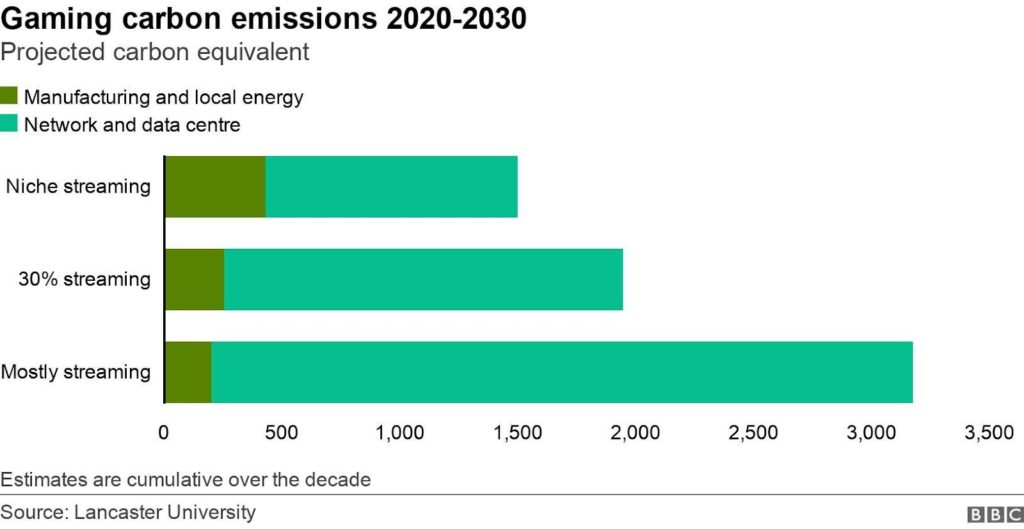According to growing studies, the video game industry’s economic effects are expected to increase, from the materials required to be mined for gaming consoles to the level of energy required for cloud gaming. However, there are ways to increase sustainability for both adult gamers and the industry.
The picture game sector is flourishing. There were 2.69 billion gamers worldwide at the end of 2020. Even though studies have shown that gaming can have some personal advantages, such as increased social skills, improved manual dexterity, and even stress relief, it is still worthwhile to look into its environmental effects and see if anything needs to change.
According to some researchers, the video game industry is a nightmare for sustainability.
The games themselves, as well as the way they are produced, shipped, and sold, all have a significant carbon footprint. Yet video games can help fight climate change. The majority of games are played online and use a lot of data, which increases “internet pollution,” which is responsible for nearly 3.7 % of all greenhouse gas emissions worldwide.
What can be done to promote good environmental changes and what can gamers, developers, and manufacturers do to ensure a greener future for the video game industry?
Impacts on the environment of the video game industry
The way that natural games and gaming consoles are made is one of their biggest flaws. Copper, nickel, gold, and zinc are just a few of the collected materials used to make comforters.
In recent years, there has been debate over where and how these materials are collected. Some have shown to be impossible to find. Some businesses have observed the issues linked to economic and human rights violations. But it’s not all negative. Companies like Nintendo have made an effort to avoid mining from contentious nations, but their suppliers have provided some conflicting results.
The environment is severely harmed by mining. The process releases billions of kg of carbon dioxide ( CO2 ) into the atmosphere from extraction to production. For instance, since its release in 2015, the Sony Playstation 4 has generated 8.9 billion kg of CO2.


projected carbon emissions from the video game sector between 2020 and 2030. Graph: BBC.
Although the majority of gaming manufacturers have made an effort to increase their sustainability by making their products more energy-efficient and recyclable, the fight is still a long way off. The gaming industry is constantly changing, and PC players and those who stream and use cloud storage are demanding more energy usage. For example, a console using cloud gaming consumes 156 % as much energy as native gaming does, while also supporting environmentally friendly initiatives like digital subscriptions. Although these innovations may never reduce energy use, they do reduce the amount of waste that ends up in landfills.
Uncovering the Environmental Impact of Cloud Computing is another book you might enjoy.
How Can You Help?
You might be shocked to learn that your hobby can cause so much harm if you enjoy playing video games a lot. You might also be wondering what you can do to change the world, which is a question that most people who want to do good but feel” too small” frequently ask.
Great news: You can definitely change things. Making wiser decisions when you buy and play games, such as: can help you be a more lasting gamer.
- When not in use, turn off your PC or consoles.
- purchasing online games as opposed to physical copies
- only when absolutely essential do you upgrade to a new console.
- avoiding extras and unwanted accessories
Additionally, you should understand how to effectively recycle your video games and consoles. E-waste, also known as digital waste, is a major issue all over the world. The UN estimates that 50 million metric tons of e-waste are produced annually worldwide, and this trend is expected to continue. This kind of waste contributes to our now overflowing landfills by allowing substances like mercury, lead, and arsenic to leach into the soil and groundwater.
Unfortunately, only about 25 % of electronic waste is recycled. Before your older console ends up in a dump, you must do your part. Surprisingly, it’s simpler than one might think to recycle video games and consoles.
Today, there are drop-off locations all over the US where you can pick up and recycle your used electronics and gadgets. Some well-known tech companies also provide recycling programs, which, if you recycle your older item with them, will also give you money or credit for another purchase.
Customers or impartial repair technicians find it nearly impossible to fix their digital products thanks to several manufacturers. Customers frequently have no choice but to purchase fresh ones as a result, which increases waste. The Right to Repair movement aims to promote repair-friendly legislation that would reduce electrical waste as a result.
Alternately, think about selling or donating your games if your console is still functional or you simply don’t want them anymore. One gamer’s trash is another player’S treasure, as the saying goes.
What Can the Industry of Video Games Do?
Manufacturers themselves will need to step up and make greater strides in their economic efforts, even though unique gamers have their roles to play in influencing the sustainability of the industry. That covers everything from social mining to more environmentally friendly packaging.
Some studios, like Space Ape, have now made a commitment to become” carbon neutral.” They have used tactics like providing a shuttle bus to get to work, switching energy providers, and providing more recycling bins. Although they are minor adjustments, if every big gaming company implemented them, the sector could lead the way in energy efficiency rather than lagged.
Additionally, there are charitable groups like Playing for the Planet. This special initiative has been joined by numerous businesses in the sector to take action against climate change. They have pledged to support the worldwide economic agenda in doing so. That covers everything from carbon offset by planting trees all over the world to recycling plastic in their products. Big “players” have the honor and duty to share their efforts with their audiences because so many of them have joined this alliance, which ought to have a good global impact.
It’s kind of a waiting game right now to see how the video game industry develops. However, it’s encouraging to see that but some well-known figures are advocating for change, acknowledging the problems, and contributing to the development of a more environmentally friendly gaming industry.
You might even be interested in reading How Businesses Can Solve the E-Waste Crisis.


